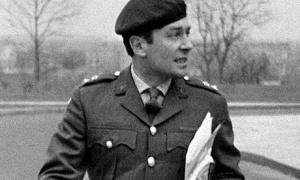Difference between revisions of "Derek Wilford"
(rename 'add' as 'stub') |
(WP) |
||
| (2 intermediate revisions by the same user not shown) | |||
| Line 1: | Line 1: | ||
| − | + | {{person | |
| + | |image=Derek-Wilford.jpg | ||
| + | |image_caption=Lt Col Derek Wilford pictured about 1972 - AP | ||
| + | |constitutes=soldier | ||
| + | |wikipedia=https://en.wikipedia.org/wiki/Derek_Wilford | ||
| + | }} | ||
Derek Wilford was a Lieutenant Colonel in the British Army Parachute Regiment. He commanded the Unit responsible for the deaths of 14 innocent civilians in Derry, Northern Ireland on 30 January 1972. The event became known as '[[Bloody Sunday - 1972|Bloody Sunday]]' | Derek Wilford was a Lieutenant Colonel in the British Army Parachute Regiment. He commanded the Unit responsible for the deaths of 14 innocent civilians in Derry, Northern Ireland on 30 January 1972. The event became known as '[[Bloody Sunday - 1972|Bloody Sunday]]' | ||
| Line 6: | Line 11: | ||
''The cavalry officer, Colonel Derek Wilford, head of the Paras' first battalion, was not only very right wing but deeply old fashioned. He'd been fighting colonial wars - he'd been in Aden not so many years before. And they treated these people in the Bogside as if they were 'natives' in East Africa. There's no evidence of any great conspiracy at Westminster, just an ignorance and an eye off the ball.'' | ''The cavalry officer, Colonel Derek Wilford, head of the Paras' first battalion, was not only very right wing but deeply old fashioned. He'd been fighting colonial wars - he'd been in Aden not so many years before. And they treated these people in the Bogside as if they were 'natives' in East Africa. There's no evidence of any great conspiracy at Westminster, just an ignorance and an eye off the ball.'' | ||
</blockquote> | </blockquote> | ||
| − | |||
==See Also== | ==See Also== | ||
| − | |||
*[[Document:Bloody Sunday: Key Soldiers]] | *[[Document:Bloody Sunday: Key Soldiers]] | ||
*[[Document:How Saville got the Higher-ups off the hook]] | *[[Document:How Saville got the Higher-ups off the hook]] | ||
*[[Document:Re-living the war in an Irish Town]] | *[[Document:Re-living the war in an Irish Town]] | ||
| − | + | {{SMWDocs}} | |
==References== | ==References== | ||
<references/> | <references/> | ||
| − | + | {{Stub}} | |
| − | {{Stub | ||
| − | |||
| − | |||
| − | |||
| − | |||
Latest revision as of 18:05, 20 June 2015
(soldier) | |
|---|---|
 Lt Col Derek Wilford pictured about 1972 - AP | |
Derek Wilford was a Lieutenant Colonel in the British Army Parachute Regiment. He commanded the Unit responsible for the deaths of 14 innocent civilians in Derry, Northern Ireland on 30 January 1972. The event became known as 'Bloody Sunday'
Journalist and Playwright Richard Norton Taylor, in an interview with Socialist Review [1] about his dramatisation of the events of Bloody Sunday described Derek Wilford thus:
The cavalry officer, Colonel Derek Wilford, head of the Paras' first battalion, was not only very right wing but deeply old fashioned. He'd been fighting colonial wars - he'd been in Aden not so many years before. And they treated these people in the Bogside as if they were 'natives' in East Africa. There's no evidence of any great conspiracy at Westminster, just an ignorance and an eye off the ball.
See Also
- Document:Bloody Sunday: Key Soldiers
- Document:How Saville got the Higher-ups off the hook
- Document:Re-living the war in an Irish Town